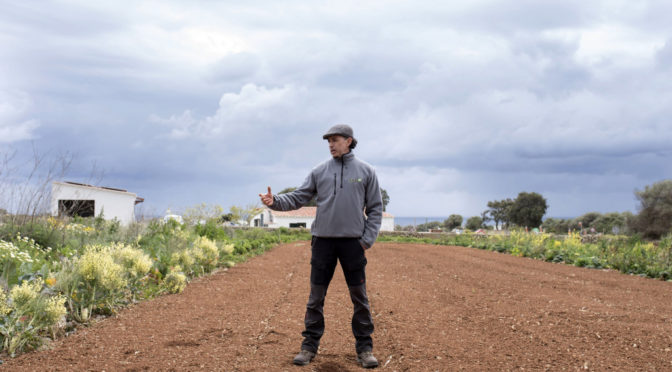Views: 1054
Pests are indicators of an unbalanced soil. More than just dealing directly with the pests, it is fundamental to understand the causes and look for natural systems to make sure they do not recur. This type of working was explained to the professional farmers within the Land Stewardship Scheme promoted by GOB.
Last Saturday, 20 March, a training day on the world of agro ecology took place with Axel Torrejón, an expert for many years working and assessing in various places throughout the world. He explained with confidence that to keep crops healthy, it is essential to start working with the soil and all the microscopic life found in it.
The day started with two hours of introductory theory. He spoke of the importance of the 3Ms, that is to say, observe the relationship between organic matter, the minerals and the microbiology of the soil, as the first step in establishing a plan for proper farm management.
He also explained what the plants that grow in our crops indicate: excess or shortage of moisture, excess or shortage of nutrients, problems of fertile soil compaction, etc. He dealt with the concept of “trofobiosis” (from the Greek tropho meaning nourishment and biosis short for symbiosis in the existence of life) which tries to explain the presence of many plant pests and diseases in relation to their nutritional and physiological state.
Afterwards, it was possible to enjoy two practical hours at the horticultural farm of Santo Domingo. There the importance of correctly designing a productive area was discussed, where it is very important to keep rows of plant diversity as much along the perimeters as the interiors of the crops. These areas with flowers collect insects and birds that help in maintaining an ecological equilibrium.
In part of the experimental workshop, it was shown how to produce homemade preventative and more environmentally friendly treatments by making use of the microbiology of leaves, cuttings and roots. Simple systems that can greatly increase production results are thanks to the formation of collaborations between fungi, plants and beneficial fauna.
When insects repeatedly attack crops, it is a warning that the soil is sick, that there is a lack of diversity and probably an unbalanced plant nutrition.
“When we are ill it is because our food is poor, our food is poor because our plants are sick and our plants are sick because our soil is sick” (Jairo Restrepo Rivera, Juquira Vandellia Cirrhosa Foundation)
This training is focussed on professionals in the farming world and is the first of a programme within the Land Stewardship Scheme as part of the “Foodnected” project, thanks to the support of the Mava Foundation and the Consell Insular of Menorca.

